When Donald Trump and Volodymyr Zelensky stood together in front of the media before their talks in September, the tense personal dynamic was grimly fascinating. It was hard to look away from the awkward body language; the sour faces, the cold, distant stares.
But if you could divert your eyes from the Ukrainian President and the man hoping to be back in the White House come January there was something interesting in the background of this scene. Or rather, someone.
Standing behind Trump was Richard Grenell. And when the two parties sat down opposite each other moments later, Grenell was at his master’s side.
In the first Trump administration, Grenell served as US ambassador to Germany. Now he is arguably Trump’s leading foreign policy adviser. The former president has called him “my envoy”.
He apparently aspires to become the next US Secretary of State – America’s foreign affairs supremo – if the Republicans win the White House next month. The candidate’s son, Donald Trump Jr, has called Grenell a “top contender” for the role.
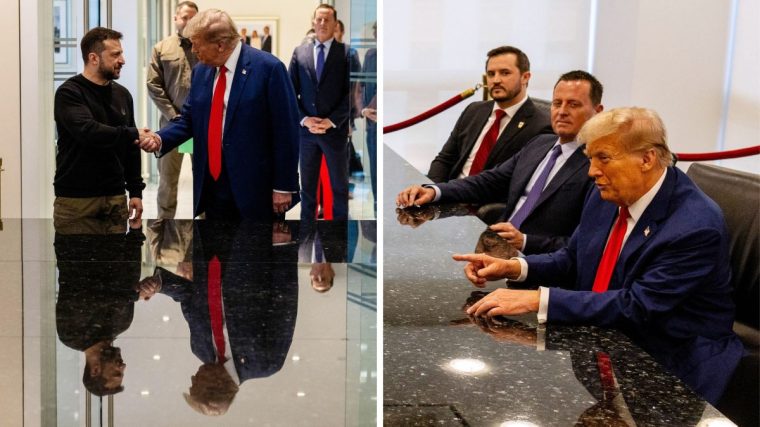
Some British and European diplomats, fretting about how Trump’s team could undermine their national security, will no doubt be concerned about this prospect.
Grenell’s credo is wholeheartedly “America First”. Even with allies, he has an uncompromising style – believing the US should “have a son of a bitch as the Secretary of State”.
“I would be apprehensive,” one Britain’s most senior former diplomats, speaking on condition of anonymity, tells i.
“What you’ve got here is somebody who appears to be self-consciously fashioning himself as a kind of Maga-Trump ideologue, for whom transatlantic relationships and the whole tradition of peaceful foreign policy don’t count for much.
“The fact that Trump has had this guy in the room with him for big meetings suggests that he sees him as a member of the Trumpian inner circle and a true believer,” he adds. “He has a track record of being pretty hard-nosed and hardline… He has been quite extreme.”
Richard Grenell’s divisive stances
- Richard Grenell has backed Donald Trump’s desire to end the Ukraine war through a deal with Vladimir Putin, writing that we can’t “dismiss diplomacy as a weak option”.
- Asked this summer if Trump is “absolutely committed” to defending Nato allies if they come under attack, Grenell said there was “only one answer” if those nations have failed to spend at least 2 per cent of their GDP on defence – implying that answer is no.
- Grenell opposed Sweden and Finland joining Nato recently because they are “not paying their fair share”.
- Saying that only the next US President should decide who becomes Nato’s new Secretary General, Grenell has threatened to oust the former Dutch prime minister Mark Rutte who took up the role this month, following years of low defence spending by the Netherlands. “It would be a shame to remove the leader after a few short weeks.” he wrote in April.
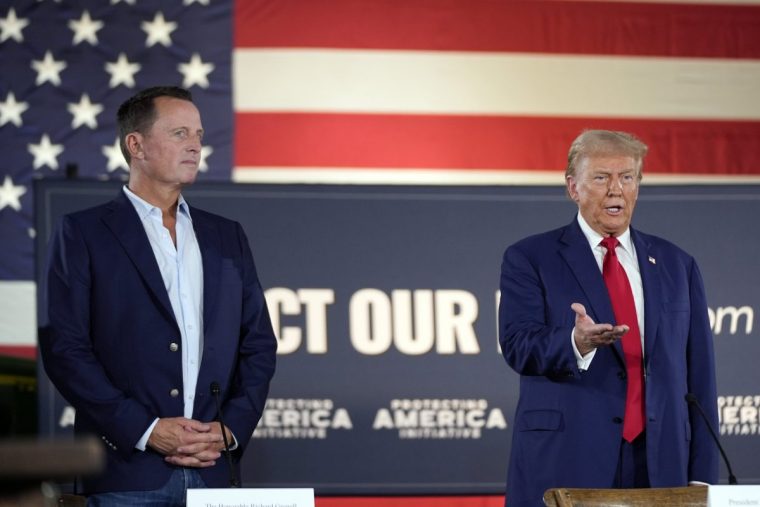
Anxious allies
The Michigan-born adviser was not always a Trump supporter. During the Republican primaries in 2016, Grenell tweeted that the candidate was “dangerous“, apparently in reference to Trump describing Nato as “obsolete”.
Even liberals recognise Grenell’s historic significance as the first openly gay person to hold a cabinet-level position in the US government, during his short spell as acting director of National Intelligence. He is also a cancer survivor, having suffered from Non-Hodgkin lymphoma – an experience which he says made him “more willing to take risks”.
By 2020, he had shifted. He was willing to defend Trump’s baseless claims that the last US election was fixed. Publicly, he has fully adopted Trump’s worldview, espousing it through Fox News appearances.
Grenell has already signalled his ideological opposition to the UK’s Labour government, through his reaction to Britain’s anti-immigration riots in August.
Sir Keir Starmer blamed the disorder on “far-right thugs”. Yet in a radio interview, Grenell seemed to defend the political motivations of those involved, while suggesting the Prime Minister was a member of the “far left”.
“I’m not sure that we have to call it ‘far right’,” he told LBC. “It’s just people who break the law… The far left is mischaracterising a lot of protests and going to the next step of cancelling people’s right to speak out, and that’s what I’ve seen too much from UK politicians.”
The former British diplomat says the Foreign Office may be concerned following these “very disobliging and intrusive” comments.
He admits that sometimes leaders with contrasting ideologies can be strong allies, like Tony Blair and George W Bush – but notes that Grenell’s riot remarks are not a one-off, in terms of criticising allies.
“He has a track record of being pretty obnoxious when he was in Germany, interfering and commenting in unhelpful ways.”
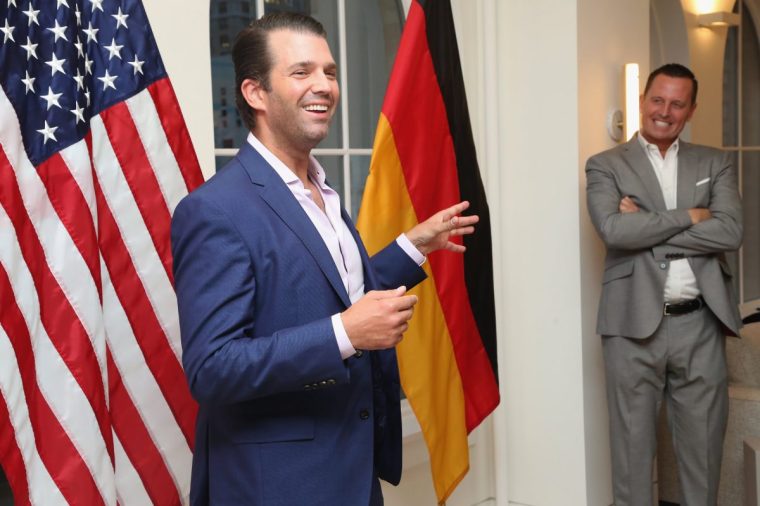
Indeed, Grenell caused a diplomatic storm in Berlin in 2018 when as America’s German Ambassador he waded into domestic politics during an interview with Breitbart. “I absolutely want to empower other conservatives throughout Europe,” he told the alt-right website, criticising “the failed policies of the left”.
The comments led the German foreign ministry to request a “clarification” from the US, while the former European Parliament president Martin Schulz accused Grenell of “behaving not like a diplomat, but like a far-right colonial officer“.
The Bundestag member Dr Nils Schmid, whose centre-left SPD party was in coalition government at the time, says Grenell “managed to antagonise” Berlin very quickly.
In person, Grenell was “articulate, friendly and polite”, Schmid tells i. But on political affairs, his style was a “one-way form of lecturing,” which tended to be “rather offensive and detrimental for his cause”. The approach was “aggressive and combative, for sure”.
“When entering the US Embassy to meet him, you didn’t feel at home with a friend. It was more like entering the Russian embassy,” Schmid recalls.
“Trump was the first American president in history to see the EU and European integration in general as an enemy. That’s why he supported Brexit. So we can assume that in a second term, Trump and his advisers would try to divide the EU, to play European governments against each other, to align with illiberal regimes like the one in Hungary. That would also be supported by Grenell.”
Richard Grenell’s career
- Age: 58
- 2001 to 2008: Director of Communications and Public Diplomacy for the US Ambassador to the United Nations
- 2012: Foreign policy spokesperson for Republican presidential candidate Mitt Romney
- 2017 to 2020: US Ambassador to Germany
- 2019 to 2021: Special presidential envoy for Serbia and Kosovo peace negotiations
- 2020: Acting Director of National Intelligence
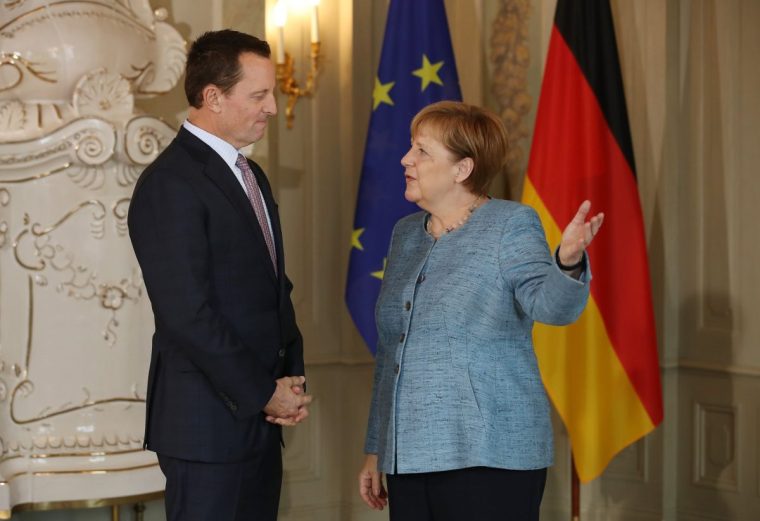
Many Trump supporters will be pleased to read these criticisms, feeling their ambassador did exactly what they wanted of him. Trump Jr was glad Grenell “spoke truth to power” in Germany.
Gordon Sondland was the US ambassador to the EU at the time and worked with Grenell. The Trump supporter, who calls Joe Biden and Kamala Harris’s record “abysmal,” tells i that his old colleague is “well qualified” to run the State Department. “He’d be terrific.”
Sondland believes Grenell’s approach was “very effective” in Berlin. “That was the Trump strategy: to deliver both good news and bad news, forthrightly and directly; to ask for what we wanted and make it clear what we’re offering in return; and to not waste a lot of time on niceties.”
Although this was “a little shocking for some of the Europeans”, he says they gradually became “happy to engage, because they realised they were dealing with ambassadors who were speaking directly for President Trump”.
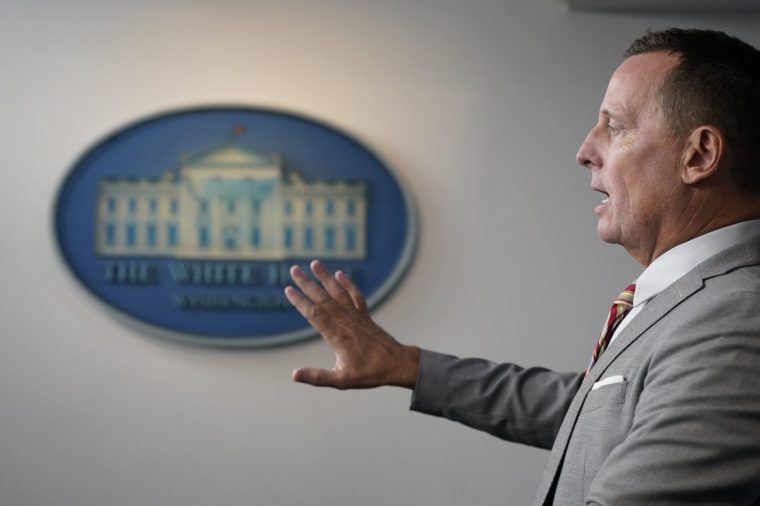
Grenell would have a “very cordial relationship with the UK,” assures Sondland. He believes that Trump has done well to shake up Nato – driving more members to increase their defence spending – and will continue US participation.
He also thinks that both the nominee and his adviser are more sympathetic to Kyiv behind the scenes than in public. “President Trump will strongly and firmly side with Ukraine, notwithstanding what he’s saying in the media and at rallies. He understands the importance of Ukrainian sovereignty… Ambassador Grenell will carry that policy forward.”
Grenell is well-versed in Republican politics. He was a member of Mitt Romney’s unsuccessful 2012 presidential campaign, but only briefly; some blamed his departure on misogynistic tweets, others suggested he was a victim of homophobia.
Grenell visited London in June to help attract UK-based Trump supporters to a fundraising cocktail party, hosted by the pop star Holly Vallance and her billionaire husband Nick Candy.
One of the Republicans who attended tells i they were impressed by “Ric”, who came across as “a very serious guy” who is “not afraid to punch back”.
The Foreign Office does not comment on prospective US policies or potential government candidates, but privately officials are confident that the “special relationship” will continue to flourish whoever wins the election.
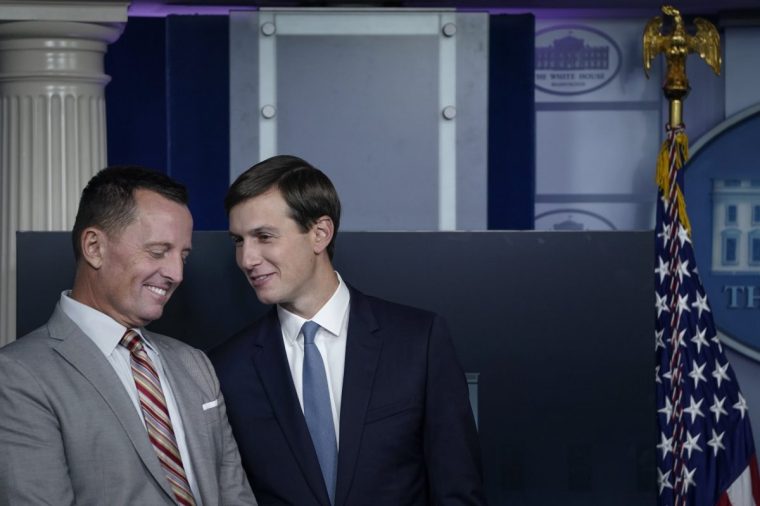
Controversies and challenges
Grenell “covets” the role of Secretary of State, according to Michael Isikoff, author of the book Russian Roulette which examines Putin’s interference in the 2016 election. But Isikoff suspects that questions about his business dealings could make the role “a bridge too far” for this “political provocateur”.
Grenell is close to Trump’s son-in-law, Jared Kushner. The pair are joint investors in a scheme to build a luxury hotel and apartment complex in the Serbian capital Belgrade, where Grenell cultivated useful relationships as Trump’s representative on Kosovo peace negotiations.
Those friendships extend to the Serbian President Aleksandar Vučić. He backs the property deal and last year presented Grenell with a national honour, the Order of the Serbian Flag.
Given ongoing concerns about Trump’s attitude to Putin, however, links to Vučić could be controversial. Vučić boasted of his “friendly relations” with Putin while meeting the Russian leader last year. In September, he said he was “not ashamed” that Serbia is “the only country in Europe that did not impose sanctions against Russia”. Although his nation has supplied shells to Ukraine and aspires to join the EU, Vučić has jokingly called himself “Little Putin”.
If Trump becomes President and nominates Grenell for the State Department job, the Senate – currently held by the Democrats – would need to confirm him in a vote. Even if the Republicans gain control in November, Grenell’s Balkan “baggage” could become a problematic, Isikoff tells i.
“Of course, there are other jobs that don’t require Senate confirmation. He could be National Security Adviser, could be a White House staff member – they don’t need to be confirmed. So he could still play a role.”
Sondland is less concerned about the Senate. He is confident Grenell would comply with “a very tough and complicated system of divestment, of Chinese walls,” to separate his business dealings from any government job.
Grenell and the Trump campaign were invited to comment but did not respond.
Grenell’s colleagues point out that he has urged Vučić to “break away from Russia and China and get closer to the West,” including by seeking alternative sources of energy.
Trump’s online guard dog
- If British or EU politicians criticise Trump, Grenell often bites back, leading some opponents to call him an “online troll”.
- After Sadiq Khan, the Mayor of London, said in May that Trump was “a racist… a sexist… a homophobe”, Grenell responded: “I’d be happy to meet to educate you on America.”
- When a European Commissioner asked for Elon Musk to censor his video interview with Trump in August to avoid “the amplification of harmful content”, Grenell accused the EU of “election interference” and “an attack on a sovereign country’s democracy”.
- When David Lammy, now the UK’s Foreign Secretary, criticised Nigel Farage in June over his argument that the West provoked Russia’s full-scale invasion of Ukraine, Grenell stood up for Farage. Lammy, he claimed, “doesn’t know” that Biden lifted sanctions on Russia’s Nord Stream 2 gas pipeline months before the war, which he suggests empowered Putin.
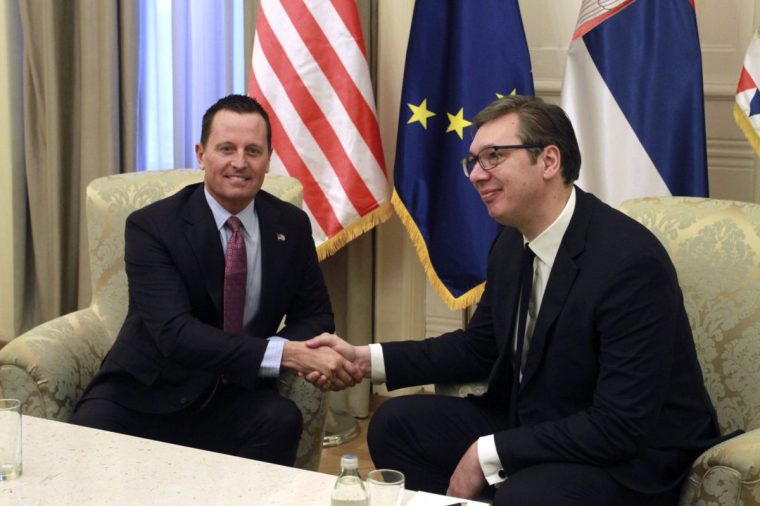
Trump’s attitude to Ukraine remains the biggest concern among diplomatic veterans. Former Foreign Office chief Lord Ricketts told i this week that he fears an attempt to force a “quick and dirty ceasefire,” despite a widespread belief that such a deal would not last.
In the Middle East, a Trump presidency is likely to revolve around bringing maximum pressure to bear on Iran.
Trump’s attitude to the regime in Tehran cuts to the heart of his philosophy. He is fiercely isolationist, but seeks to avoid the US becoming embroiled in foreign wars by instilling fear in opponents – threatening devastating results if he does choose to strike.
Nobody has summed up this better than Grenell himself.
The US requires a “tough” Secretary of State, he explained in March, “who goes in to these tables and says: ‘Guys, if we don’t solve this here, if we don’t represent peace and figure out a tough way, I’ve got to take this file, go back to the United States and transfer it to the Secretary of Defence, who doesn’t negotiate. He’s going to bomb you.’”
Grenell, it seems, is ready to be that person.

